Keeping pond water clear the natural way is easy, and you don’t have to use any harsh chemicals either.
In this post I will show you step by step exactly how to get rid of that gross algae buildup and clear the water quickly, without harming your fish or plants.
Several years ago, my small backyard garden pond became completely overgrown with mossy, weedy algae. It was green, cloudy, and disgusting – plus I could no longer see my fish or plants.
I was pretty nervous when I first discovered the problem, and worried that I would have to use expensive chemicals to treat it. Or, even worse, that those chemicals might kill my fish and plants.
It’s normal for ponds to have a greenish or brownish tint to them. However, it’s not healthy when the water becomes mossy, or so green that you can’t see through it.
Well, as it turns out, clearing out the algae naturally, and keeping your pond water crystal clear is easy. Whew!
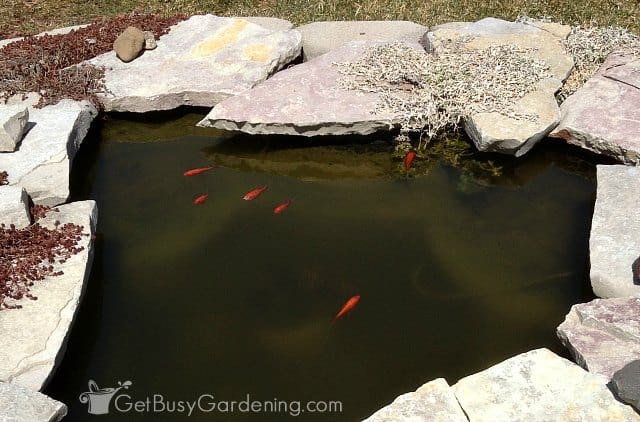
What Clears Pond Water Naturally?
It sounds strange, but the answer is barley straw. Not only is it completely natural, but it won’t harm your fish or plants, and it’s inexpensive to buy too.
How it works is that, as barley straw decomposes, it releases something similar to hydrogen peroxide. This non-toxic by-product will choke out and kill pond algae, leaving the water crystal clear.
Below I will show you how to use it step by step. However, if your water is brown, thick and mucky, or it smells bad, then first you need to learn how to properly clean your pond here.
How To Clear Your Pond Water Step By Step
If you want to start seeing clear water in your pond as fast as possible, then follow my steps below. You only need a few supplies.
Supplies Needed:
- Toilet brush (or similar)
- Barley straw bundle (instead you could buy it in liquid form, or use the pellets)*
- Twine string (optional)
- Hydrogen peroxide (optional)
* The amount of barley straw you’ll need depends on the size of your pond. The package on the product that you buy should tell you exactly how to figure it out.
Instructions
Step 1: Remove the algae – To speed up your efforts, start by manually removing as much of the algae from your pond as you can. Don’t worry this sounds harder than it is.
An inexpensive toilet brush works great for this task, and you can use it to scrub the insides of your pond walls too.
Ideally, you would buy one to use specifically for this purpose. I mean, what would be more disgusting – using an old toilet brush in your pond, or using your pond brush in your toilet?
Step 2: Make a barley straw bundle (optional) – The barley straw that I use comes in bundles that are too large for my 90 gallon garden pond.
So I made smaller ones out of the mesh packaging that they came in, which I reuse year after year. I simply used some twine string to tie the mesh closed and secure the bundle.
Related Post: How To Winterize A Garden Pond Step-By-Step
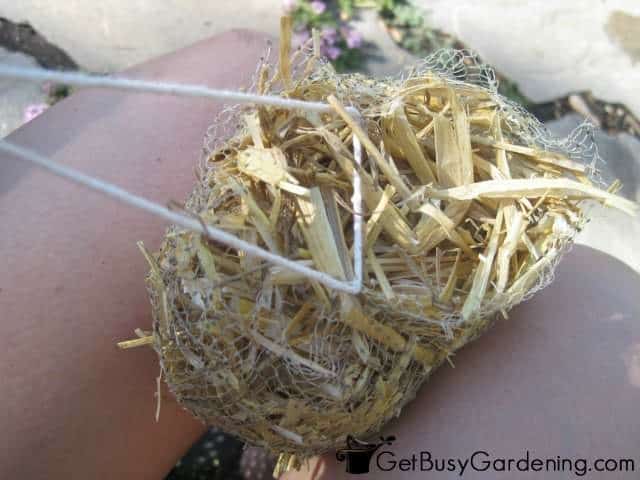
Step 3: Add the barley straw to the water – It’s best to put your barley straw near a fountain or waterfall where the water will flow through it.
This will help to circulate the water and clear it much faster. I used a long piece of the twine to hang the bundle from my waterfall.
The bundle will float at first, which isn’t always pretty. But once the straw starts to break down, it will sink so it’s no longer visible on top of the water.
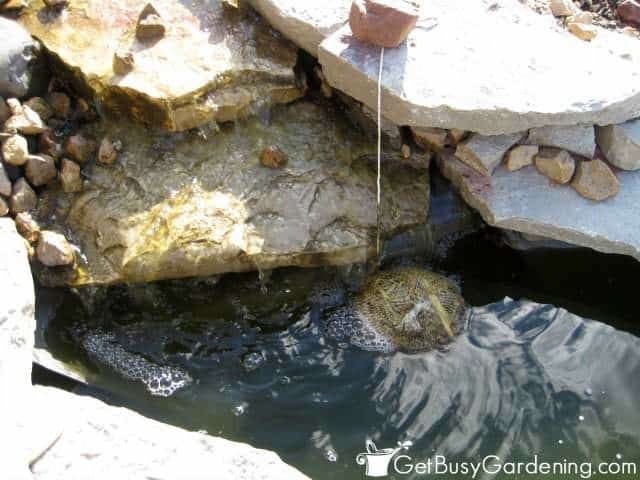
Step 4: Rinse the filter – To jumpstart the process, you should make sure your filter is clear so it can run smoothly and efficiently. I take mine out and rinse it off with the hose.
But you could use some of the water from your pond if you don’t want to risk killing the good algae that’s living in your filter.
If your pump didn’t come with a filter, I highly recommend that you get a universal pump filter box. It will make keeping your pond water clear sooooo much easier.
Step 5: Use hydrogen peroxide (H2O2): It takes a few weeks for the barley straw to work. So, to clear your pond water faster, use hydrogen peroxide (and no, it won’t kill your fish). Pour it right next to the fountain or waterfall to disperse it.
NOTE: I don’t know if there’s a special formula of H2O2 per gallon of water, so I recommend doing some research for your specific pond size. Mine holds 90 gallons of water, and I added a 1/2 cup of H2O2.
Step 6: Rinse the filter daily – I recommend rinsing your filter daily, which will help to remove the algae and speed up the process.
You should start seeing results within a week or so. In no time, the water in my pond was crystal clear, and it stayed that way all summer.
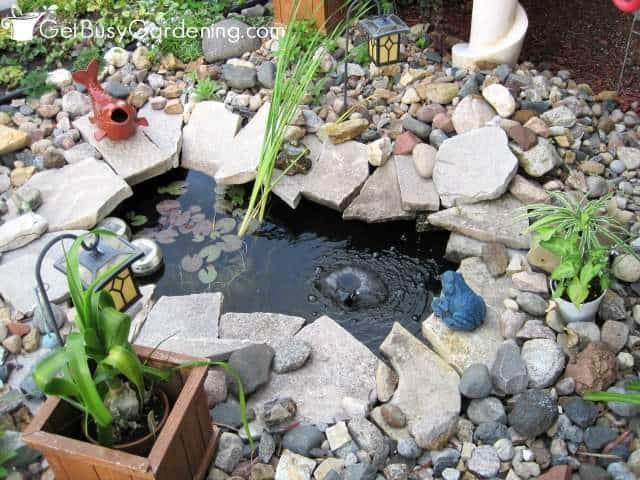
How To Keep Your Pond Water Clear
Once your pond water is clear, you can easily keep it that way for the long-term. Here are my tips for the best success:
- Use barley straw regularly – Put fresh barley straw in your pond every spring. One small bundle lasts me all summer.
- Keep the filter clear – You should get into the habit of rinsing your pond filter every couple of weeks, and probably more during the hot summer months when algae grows the fastest.
- Clear out the debris – Removing any debris that falls into the water is very important to ensure that it stays clear. My skimmer net makes this task super easy.
- Test the water regularly – You can get an inexpensive test kit, and that will help you maintain the perfect balance in your pond so you can prevent algae growth.
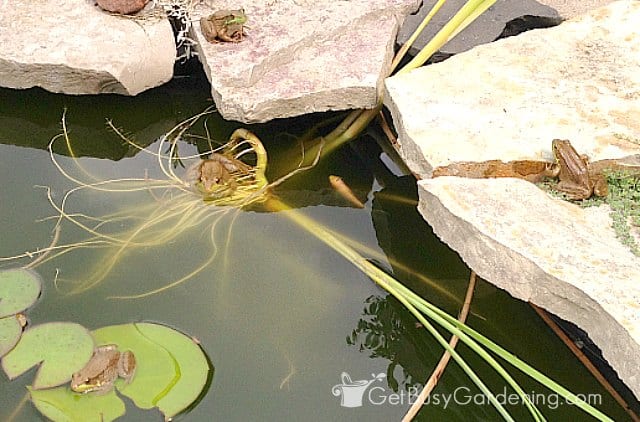
FAQs
Pond water turns green because of algae. It’s normal for it to have a greenish tint, but if it’s soupy or has mossy growth in it, then you should work to clear it ASAP.
Pond water turns brown when plant debris, like fallen leaves, and fish waste build up for too long. It’s normal for the color to be brownish, but it should not be mucky or stinky.
Not all types of algae are bad for your pond. But string algae can take over a small pond very quickly. If you don’t get rid of it, it could eventually starve your fish and plants of their oxygen and nutrients.
I love my little garden pond again now that the water is crystal clear, and keeping it algae-free isn’t that difficult when you know how. It’s nice to be able to watch my fish swimming around. Plus it constantly has frogs and salamanders in it too – a wonderful sign of a healthy pond.
Share your tips for keeping pond water clear in the comments below.
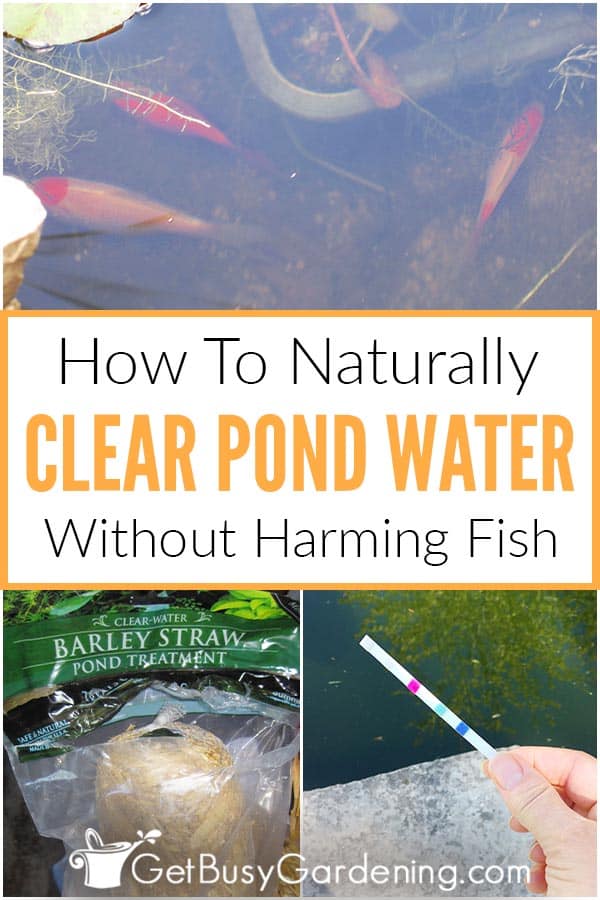
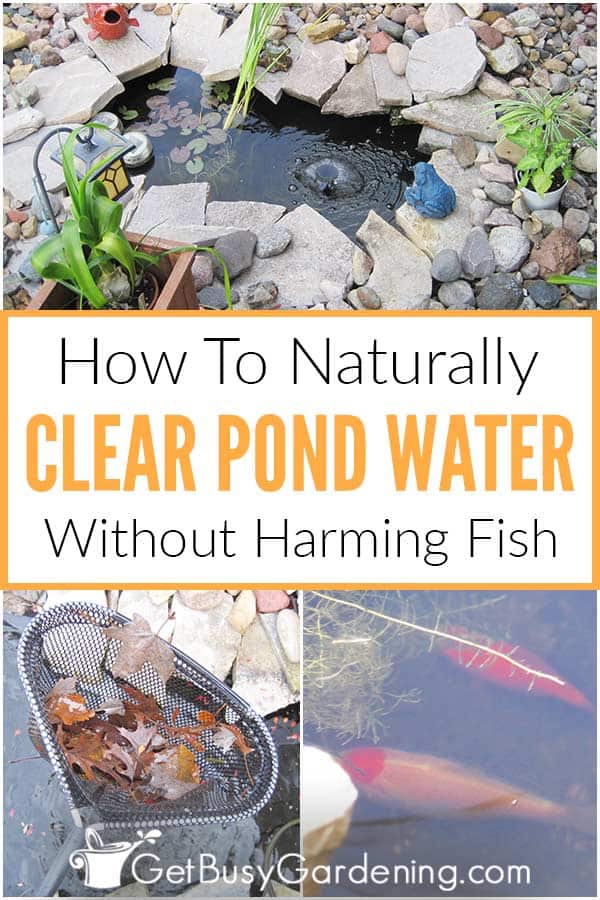
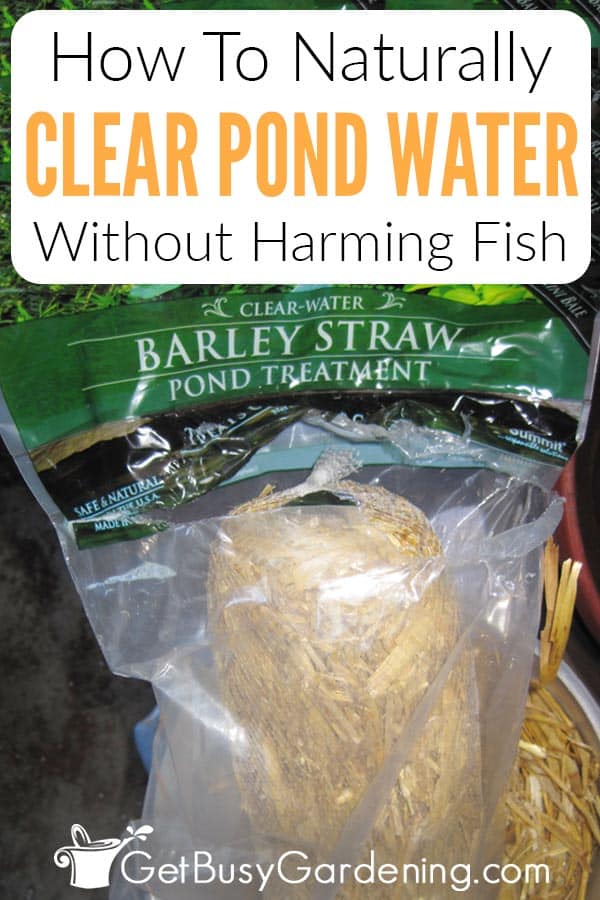
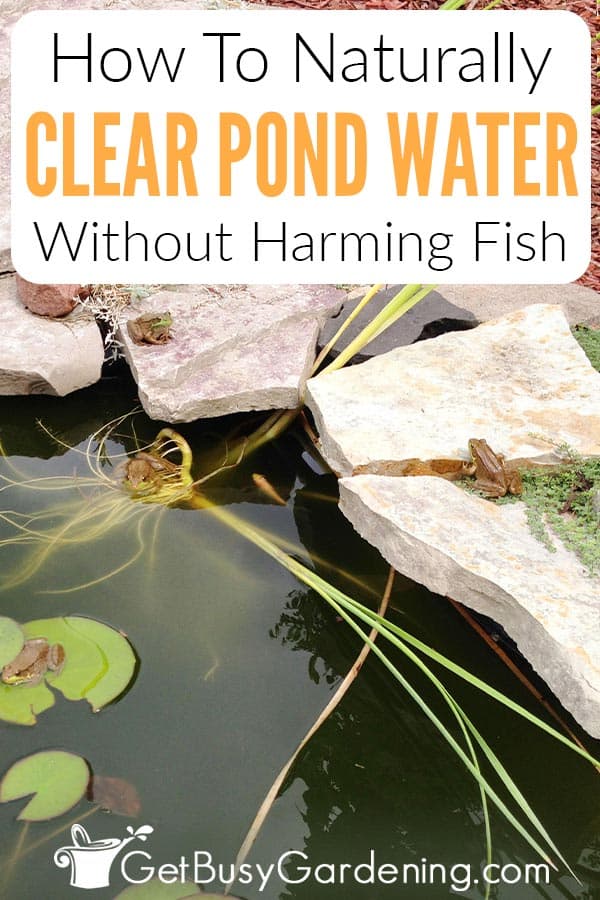
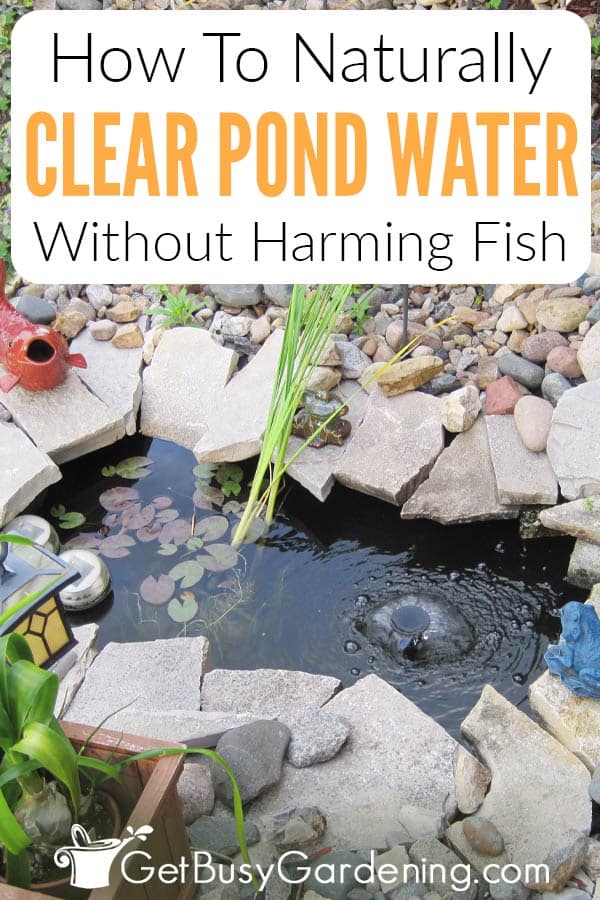
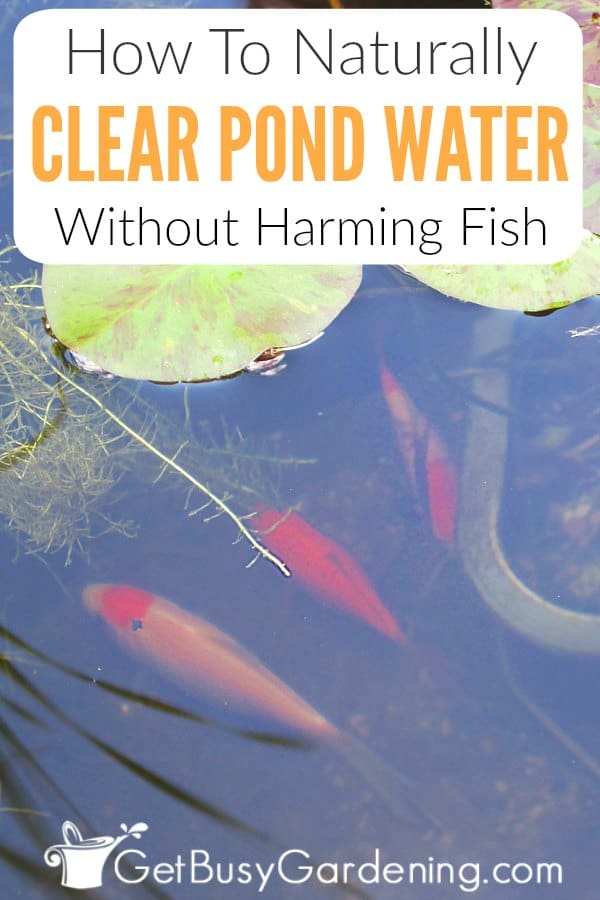
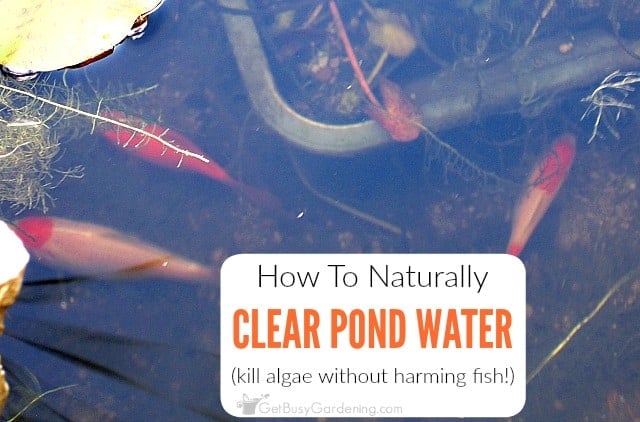

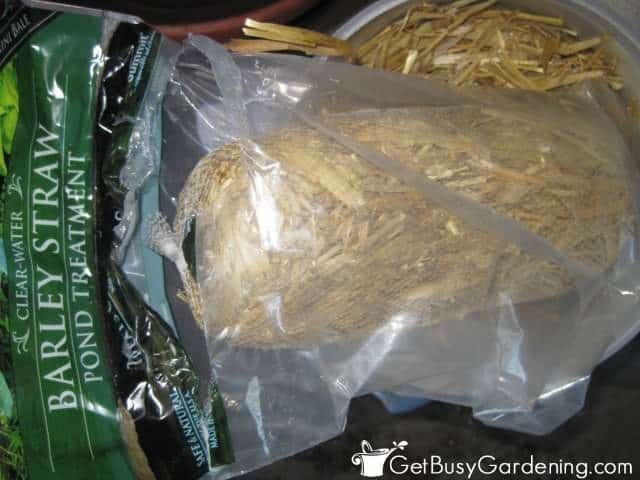
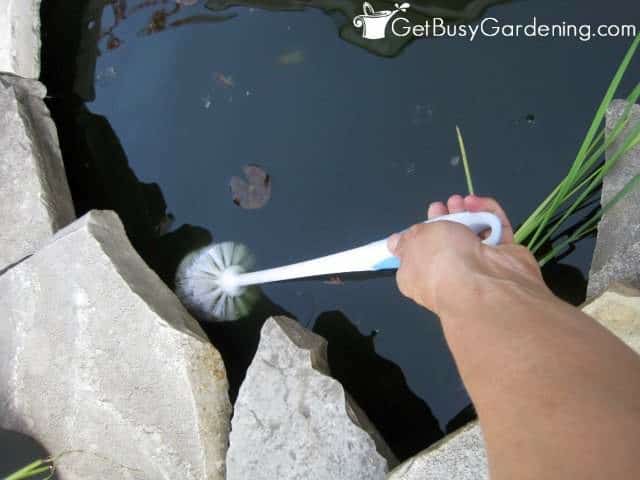
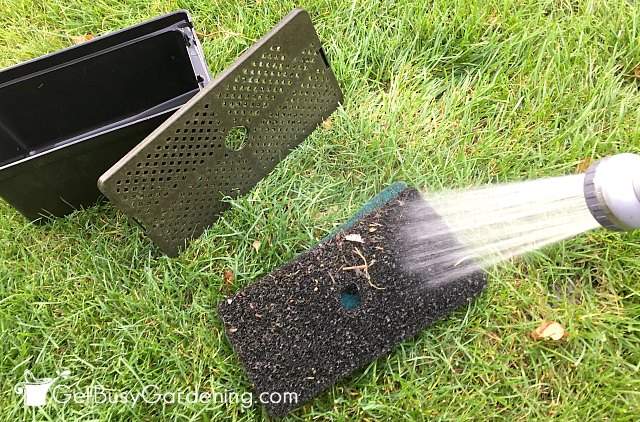
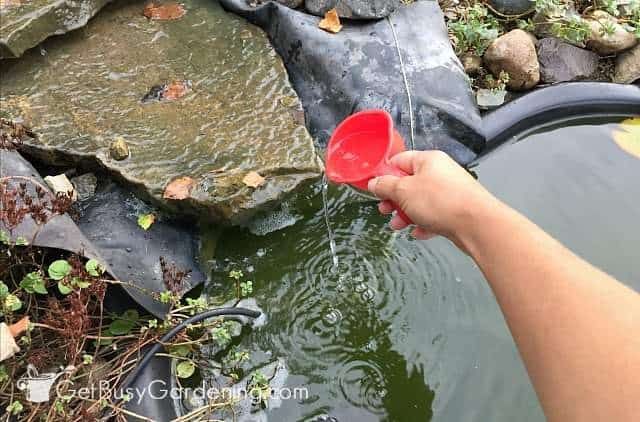

ALAN FISHER says
imo ,you should not wash /rinse the filter media[sponge] with hose or tapwater as it kills the good bacteria use rain water, or declorinated water , even a bucket of pondwater .. .
Treena says
Hi I have a large natural spring pond which my horses drink from,I’ve had string weed in there but when I brush some back I’ve been finding lots of black beets with red fins.. how can I clear without disturbing these?
Many thanks thanks
Amy Andrychowicz says
The remedies we recommend in this article for clearing pond water are all natural and will not harm any bugs or other organisms in the water.
stuart says
what do you suggest for a 0.75 acre pond are these methods still viable?
Amy Andrychowicz says
Yes, these methods will work for clearing the water in any size pond.
Mark says
I have a 5000 gallon pond and want to get rid of the moss in it. The pond waters grape vines that I don’t want to harm. Will your product work?
Amy Andrychowicz says
Yes, the methods I recommend in this article for clearing pond water are all natural and won’t harm your plants or fish.
Charlene says
My grandchildren threw dirt in my pond. I need a tight skimmer to remove it. Is this available?
Amy Andrychowicz says
Yes, you definitely should be able to find a pond skimmer that has a tighter mesh that will help you remove at least some of the dirt from the bottom of your pond. You could also use a pond vacuum, which is expensive to purchase, but you may be able to rent one.
Bridgette Ranck says
Hi Amy. I have a small 100 gallon pond with waterfall that I set up this summer and this post has been a lifesaver! I was wondering if you have a book out that can be purchased about this.
Amy Andrychowicz says
Yay, so happy to hear this tutorial has been a lifesaver for you and your pond water! 🙂 I do not have a book on the subject, but thanks for asking!
Micheal CaseyBeich says
Can I use excess pond water that has been treated with a barley bail to water my edible vegetable garden?
Amy Andrychowicz says
Yes, pond water is great for your garden!
Nadine says
I have a very small pond, 35 gallons. There are plates and a few goldfish. The water is green and cloudy. I also don’t have any filter on this pond. I added a canna plant, a dwarf papyrus and some other plant but the water doesn’t seem to be getting better. What do you suggest? Will the barley hay help with the pond set up I have? Thank you for your help.
Amy Andrychowicz says
While the barley straw will kill the algae in your pond water, adding a pump will definitely help to clear it faster, and make it easier for you manage it long term.
terry says
So if I drain and clean the pond do I need to add something in the water for the chlorine? Also I am unable to see the fish since it is so murky. They are small and also have some gold fish. We are not feeding them at all. This is the first summer for the pond. I dug it last fall. The goldfish made it through the winter and we could see them for a while this spring but the water kept getting worse and worse.
Amy Andrychowicz says
Let the water sit for at least 24 hours so the chlorine can evaporate. Remember that it can take some time for the barley straw to work. So try adding some hydrogen peroxide like I mentioned in the post. That can help speed things up.
terry says
I have a 2000 gallon pond with a stream. It has 24 fish in it which I can’t see because the water is so murky. I have used charcoal…barley straw…another pump covered in batting…and now am on my 3rd week of beneficial bacteria…nothing is working. It seems to get worse. I really dont know what the next step is except perhaps drain it which I really would rather not. Anymore suggestions?
Amy Andrychowicz says
I would definitely recommend cleaning your pond, and also testing the water to see if there’s some imbalance that needs to be corrected. The remedies you mentioned for clearing pond water do take some time to work. So keep that in mind too. Also, you mentioned that you have 24 fish in the pond, which might be too much, depending on how large they are. If they are very large koi, then you may need to relocate a few of them. The rule of thumb is about one 6″ fish for every hundred gallons of water. Oh, and make sure you’re not overfeeding them. All that excess food can make it harder to clear the water.
Chris A says
I would suggest adding a UV filter or 2 (considering the size) I believe I seen 1 in Amazon $150. My pond is only 900 gallons and I installed one and see. A difference in about 4 hours. After installing clean daily for a week. Once you have it under control you can reduce to 2-3 times a week.
Daniel Waligurski says
Cured my green water by building a pergola. I built a 10×20 over the pond with a porous cover. Also a plastic barrel used with rock and filters. It kept my 3000 gal. pond crystal clear all summer.
Amy Andrychowicz says
Wow, sounds great! Thanks for sharing your tips for how you cleared your green pond water.
Melody says
Must it be Barley bails or can I make my own bundles out of cow hay?
Can barley bails be cleaned and reused?
Thanks
Amy Andrychowicz says
No, regular hay won’t work. It must be barley straw. The barley straw will rot in the pond, and as it does, it will release the chemical that clears the water. You can’t reuse the bundles, because the straw will rot away. 🙂
Sue Ising says
I have a 9000 gal pond used to be crystal clear now green and murky i need help dont’ want to keep buying chemicals we put in a gravel filter this summer so it is helping some…..
Amy Andrychowicz says
With such a large pond, tossing in a barley straw bundle or two every spring might be your best bet. It will take some time for the filter to clean the water, so the fact that you’re already noticing a difference means you’re on the right track. Good luck!
Pat says
Bought barley straw now what do I use to make a smaller bag to hold the straw. .?
Amy Andrychowicz says
I used the mesh bag that my barley straw came in. I just cut it in half, which ended up being the perfect size for my small pond. The mesh bags that some types of produce comes in work great too. You could also buy a mesh material at a fabric store, like tulle or something similar to that, to use to make a small bag for it.
PReed says
I bought a mesh bag at a dollar store. They are usually in the washing section, use for washing delicate fabrics in the washing machine.
Patt says
I went to the fabric store. then I got material that looks much like gunny sack so that water will get into it. I made 6 bags and stuffed them with the straw. That will be enough for the summer. But the material looks much like that old doily stuff.
Nadene Sanderson says
Will adding bleach to a pond work? I have no fish and no plants. I want to see the bottom again.
I do have a waterfall, skimmer, as well. No debris is left in it. But does have full sun
Amy Andrychowicz says
Bleach would probably work to keep your pond water clear, I have never tried it myself. However, that would kill everything in the pond, plants and all – and it wouldn’t really be a true pond anymore. So, I don’t recommend using such a harsh chemical, especially when there are lots of more natural alternatives that work great – and then you would be able to keep fish and plants in your pond.
Patt says
You might want to try Barley straw. I make bags to hold it, and get the fabric at the fabric store. I order the straw from the Amazon. This will help the algea. It will not make for a perfectly clear pond. But using bleach will be pretty harsh. The dogs and birds are harmed with bleach. Feel free to ask me more.
Patt says
It will but birds and other animals drink that water. So not so good.